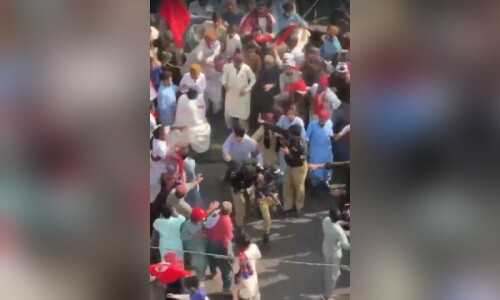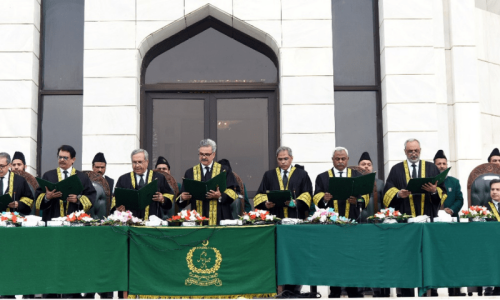IT would be a serious misstep if parliament were to give safe passage to the banned TTP.
Apparently, the burden and liability of the peace talks with the terrorist group have been passed on to parliament, which is weak and seems willing to lend a shoulder to the security institutions.
The talks with the TTP are not merely a security issue entrenched in the region’s geopolitical landscape; instead, it is a case for the soul of Pakistan. Both state and society have developed a rare consensus in the protracted war against terrorism: the country needs a review of its ideological paradigm. However, this consensus has not yet yielded some miraculous outcome as the state, by design or inadvertently, continues to exploit religion and empower the radical groups. Some observers also question if the political parties and civil society organisations really believe in resisting radical religious and ideological forces. They also ask if the PPP’s bid to bring the issue to parliament is merely a trick to give legitimacy to an exclusive process led by the security institutions.
Giving legitimacy to the talks with the TTP does not fit in with the PPP’s political paradigm of ‘democracy is the best revenge’. Mainstreaming a terrorist group will harm and shrink political spaces for the citizens of this country and parties such as the PPP, which have been more vocal and aligned against extremism.
The TTP was found guilty of having assassinated former prime minister Benazir Bhutto, but the PPP sees a bigger plot behind the assassination. Though not certain, it appears that the current party leadership may be thinking beyond its own misgivings in the country’s larger interest. The party chairperson holds the portfolio of foreign minister in the coalition government and must be inspired by his mother’s ideas, including enhancing trade relationships with the Central Asian states. Back in the 1990s, Benazir Bhutto had permitted her interior minister, Gen Naseerullah Babar, to create an Afghan Trade Development Cell in the ministry to promote trade routes to Central Asia and to provide the Afghan Taliban with funds.
For a long time, state institutions have been giving hints of a shift from a geostrategic to a geo-economic plan. The PPP vision may fit well with the new paradigm, but that would require removing the TTP obstacle and providing more confidence to the Taliban regime in Kabul; the institutions are apparently also relying on relations with Kabul for their intended geo-economic shift.
Mainstreaming a terrorist group will harm and shrink political spaces for the citizens of this country.
The government is giving the impression that talks with the TTP are still at a stage where a national discourse is not needed. In fact, very recently, the Parliamentary Committee on National Security (PCNS) received a briefing from the military leadership on the TTP talks. The committee formally gave approval for holding talks with the banned outfit. The government insists that all negotiations would be conditional upon parliament’s approval. One can foresee that a few dissenting voices in the parliamentary debate will not be able to prevent the outcome if the deal is a fait accompli.
Read: Broken promises fuel mistrust of TTP bid to enter mainstream
Many of the arguments in favour of the talks with the terrorists have been analysed on these pages. Still, according to reports, in the last PCNS meeting, the military leadership told lawmakers that the TTP might join the Islamic State-Khorasan (IS-K) and that a peace deal with the TTP is a compulsion and not a choice. One may recall that the idea of talks with the TTP was floated back in 2019, even before the Taliban takeover of Kabul. The argument at that time was to identify the missing persons, supposedly hiding under the cover of the TTP fighters. Perhaps, Pakistan’s state institutions see the terrorist group in enhanced mirror settings.
Regarding the IS-K factor, there are certain probabilities, and a lot depends on possible internal rifts within the ranks of the TTP. The TTP is under allegiance to the Taliban supreme leader, and joining the ranks of the IS-K would mean that they would have to denounce the Taliban before swearing allegiance to Abu Hassan al-Hashimi al-Qurayshi, the self-proclaimed caliph belonging to the Islamic State group. Can the TTP collectively commit such a big mistake, especially when the Taliban regime has declared war on the IS-K?
The most influential faction within the TTP favours the talks as they see a victory achieved without violence; a small number of them disagree with the hypothesis. Even the dissenters will think twice before joining the IS-K as the group is very exclusive and the prospects of its long-term sustainability are bleak.
There is a high probability that Al Qaeda will support the peace talks, as security experts weigh in with their opinion that any deal between the TTP and the government of Pakistan will also provide Al Qaeda some influence in the tribal districts along the border. Moreover, the deal will give an opportunity to the IS-K to enter Pakistani territory.
More importantly, the TTP has consistently asserted that it would not back down from its core demand of the merger of ex-Fata with Khyber Pakhtunkhwa being reversed. This was said by the TTP chief Mufti Noor Wali Mehsud himself in a YouTube interview which did several rounds on social media and was apparently conducted somewhere in Kabul.
There are also rumours that the Pakistani jirga which visited Kabul recently got the impression that the TTP is confident that the government of Pakistan will agree to its demand of reversing the tribal districts’ status, and has sought three months to negotiate the demand.
If this is the case, will parliament amend the Constitution to fulfil the demand of a terrorist group? If it happens, one can imagine the legal, political, social and ideological consequences. It would simply mean the state’s surrender to terrorists. Can the state institutions not craft another strategy to deal with the TTP threat? And do the political parties have the courage to say that they want the matter deferred until there is an open debate in society and within and among political parties?
The writer is a security analyst.
Published in Dawn, July 10th, 2022














































